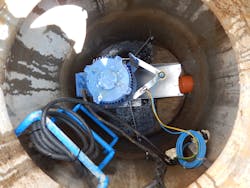Solving rest stops' wastewater blockages
Drivers rely on motorway rest areas and service facilities to ensure their comfort and safety on long journeys. However, for Austrian operator ASFiNAG, heavy use of these facilities was leading to maintenance headaches. Now, thanks to new grinders and pumps technology, ASFiNAG’s wastewater pump blockages are becoming a thing of the past.
ASFiNAG operates 87 fully-equipped service areas across Austria’s motorway network, offering fuel, food, toilets and washrooms, along with a further 55 rest areas equipped with showers and toilets. Often situated in remote locations, most of these facilities use their own sewage pumping stations to remove wastewater from site.
As standard, the company uses high pressure technology in these stations. Submersible grinder pumps break up solids and pressurize the wastewater before transporting it through small-diameter (DN50) pipes to the municipal wastewater network. The approach is a proven and cost-effective solution to the challenges of wastewater handling in places where conventional gravity sewer networks cannot be used.
Heavy Traffic
Over time, however, changes in customer behavior have created problems for ASFiNAG. While grinder pumps can handle wastewater reliably for many years with minimal attention, they can be blocked by large, sudden volumes of unconventional materials, such as wet-wipes or diapers. Furthermore, tougher items that cannot be shredded by grinder pumps collect in the sump over time. With more of these materials finding their way into the wastewater system at certain sites, the company’s maintenance teams were being called out almost every week to repair blocked pumps.
Lifting and clearing these pumps from the wet well of a sewage pumping station is costly, time-consuming work. Furthermore, with no effective way of dealing with the wastewater, ASFiNAG sometimes had no choice but to temporarily close the toilets at affected sites while repairs were undertaken.
Cutting Down to Size
First, the company’s “Muffin Monster 10k” —a low speed grinder — would receive the wastewater before it entered the wet well, efficiently shredding and crushing large debris before it reached the pumps. Then, two “Piranha” grinder pumps would use unique cutting technology to further reduce the solid, and generate the pressure required to transport the wastewater away from the site.
Sulzer built and delivered the pumping station as a complete contract, designing and constructing the pump control panels as well as supplying the pumps and grinder. Since its installation in December 2020, the site has suffered no further issues with pump blockages.
Based on the success of this first installation, ASFiNAG has ordered two more Muffin Monster units. These will be installed at another site to replace a system which removes debris and places it in a skip, eliminating the costs associated with skip removal and waste disposal.
“Our customers expect our services to be available whenever they need them, day or night,” says Alexander Holzedl press officer at ASFINAG. “Improvements like this are part of our proactive approach to the continual improvement of our facilities. The Sulzer technology has proved to be completely reliable, cost-effective, and problem-free.”

